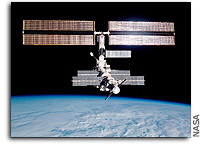ISS On-Orbit Status 2 July 2002
 All ISS systems continue to function nominally,
All ISS systems continue to function nominally,
except as noted previously or below.
Before breakfast, all crewmembers completed the periodic Russian
medical experiment protocols of calf volume measurement (PZEh-MO-7)
and body mass measurement (PZEh-MO-8). FE-2 Sergei Treschev
then closed out the experiments and stowed the equipment.
CDR Valery Korzun performed a switchover of the Service Module (SM)
audio subsystem (STTS) to its backup set. The STTS will be on
the backup set for 2-3 weeks until further instructions from
MCC-Moscow. [The "Voskhod-M" STTS and its
telephone/telegraph audio paths and comm stations were checked out by
Korzun and Treschev on 6/26.]
Afterwards, the two cosmonauts installed the electronics box
containing the TGK/SM US-21 matching units in the Progress vehicle
(TGK). Korzun then mated the system to the BITS2-12 onboard
measurement telemetry subsystem. The US-21 matching units
connect the Progress motion control and propulsion systems to the SM,
so that they can be commanded by the SM computers. The new
configuration will be tested with a thruster firing tomorrow.
After lunch, Korzun and Treschev worked two hours on Progress
unloading, cargo transfer and en-suite IMS (inventory management
system) tracking with the barcode reader.
FE-1 Peggy Whitson prepared the TOCA (total organic carbon analyzer)
for calibration. TOCA is a water quality monitoring instrument
for determining concentrations of total organic carbon, total
inorganic carbon, total carbon, pH value and conductivity in water).
After the calibration, the equipment used for it was stowed
again. TOCA analysis is scheduled for tomorrow.
Whitson then collected water samples in the SM from the SRV-K hot tap
and the EDV container of the water supply system (SVO-3B). New
instructions had been uplinked, but not in time to prevent some
initial confusion on board, aggravated by the interference with
ongoing Progress cargo transfer activities.
After the samples were collected, Peggy processed them with the WMK
(water microbiology kit). [Task must be performed within six
hours of the sample collection.]
During a Russian comm pass at 6:30 am EDT, Treschev worked on the
SM’s gas analyzer (IK0501), setting up the IGZ analyzer unit for an
O2 (oxygen) readings correction by the ground. [IK0501
analyzes the air flow pumped through it for humidity (H2O), oxygen
(O2), carbon dioxide (CO2) and hydrogen (H2), and converts its
measurements into partial pressure values going to a monitoring
laptop and, if they exceed limit values, to the caution and warning
panel (PSS).]
Peggy Whitson completed her weekly session with the NTXN
Interactions experiment, filling out the computerized questionnaire
to record psychological observations on personal preferences,
interpersonal dynamics, etc. on the MEC (medical equipment
computer).
Regular routine servicing tasks were performed by CDR Korzun, with
BRPK-2 water condensate separator inspection, Whitson, doing the
payload status checks, and Treschev, preparing the IMS delta file for
downlink.
Other maintenance tasks completed by the crew over the weekend were
inspection and cleaning of bacteria filters in the Airlock, Node and
Lab.
At 9:34am EDT, the crew participated in an interactive media
interview with stations WUSA-TV in Washington, DC, and KCRG-TV in
Cedar Rapids, IA. Downlink was on Ku-band (video) and S-band
(audio). The station residents were also asked by PAO to record
a short ISS tour without audio, to be played back in a live PAO event
with CNN on 7/9, with the crew then narrating over the video live in
real-time.
The periodic Russian solar array efficiency test was completed
overnight as planned, and the ISS was then maneuvered (at 2:30am EDT)
from its temporary sun-oriented XPOP attitude to back to
earth-oriented LVLH TEA (local vertical/local horizontal torque
equilibrium attitude).
There were three RPCM (remote power controller module) events in the
past few days. The first one, a health flag indication on an
RPCM controlling two CMGs (control moment gyroscopes), was refreshed
OK on 6/30. The second was a power reset in the Lab (also
closed), and the third was a tripped RPCM in the Lab which provides
one of two redundant power feeds to the Lab forward emergency
lighting power supply (ELPS). Since this could indicate an
eventual hardware problem, the RPCM was left open for now. The
Lab forward ELPS continues to function properly on one feed.
During the docking of Progress 8P on 6/29, MCC-M (TsUP) dealt with
two minor problems: an issue with a hand controller of the TORU
teleoperated backup docking system, and an offnomin§Ì









